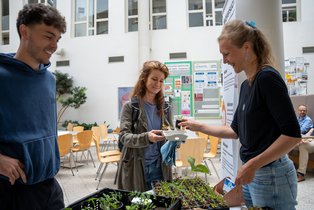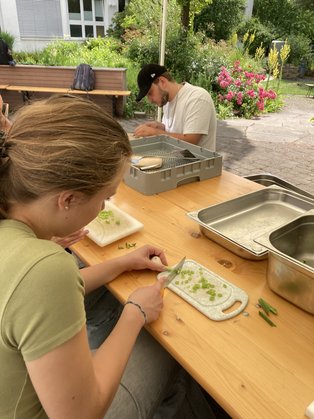Services for all
at UW/H
Services for all
at UW/H
You are here:
Helping shape the food transition: Project field test
Latest news
Seasonal recipes by students for students
Cooking is more than just preparing food, it is an expression of creativity, community and enjoyment. As part of the Stufu course "Kolloquium Feldversuch", a collection of recipes has been created by students for students with simple, delicious, seasonal dishes for the whole year.
These recipes come from real life, from small kitchens between the stress of studying, lack of sleep and a tight budget. But good food doesn't have to be expensive.
Current offers
Time for a team event? On the field, you can expect exercise in the fresh air, a small work assignment with visible success and informative insights into the design of biodiversity-promoting agriculture. While working in the field, you can grow together and literally reap the rewards of your work. If you are interested, please send your request to: Stella.Buenger@uni-wh.de
We rarely know exactly where the vegetables we eat come from. If you take part in the field time, you can watch the vegetables grow. Employees and students are invited to join in on Thursdays from 12:15 - 13:15.
After getting to know and cultivating the herbs and medicinal plants last season, this year we are heading to the vegetable field. By helping with soil preparation and planting in the spring, tending in the summer and harvesting in the fall, we will experience what bio-regenerative agriculture means and how it works.
Bio-regenerative agriculture prioritizes soil health. Soil health is inextricably linked to the overall health of our food system. Soil health affects everything from plant and animal health to human well-being and the future of our planet. It's about creating farming systems that work in harmony with nature to improve the quality of life for all creatures involved, not just protect it.
From growing tips for your own vegetable garden to complex interactions between different ecosystems, it's all there. Learning by experiencing and having fun while doing are our motto for the field time.
Please bring appropriate clothing for the weather and sun protection if necessary.
All dates:
The field time takes place on nine dates from April to July, always on Thursdays from 12:15 - 13:15.
24.04.
08.05.
15.05.
22:05.
05.06.
12.06.
26.06.
03.07.
10.07.
Registration:
Please register so that we can plan the work assignments properly.
Registration by e-mail to: Stella.Buenger@uni-wh.de
Spontaneous volunteers are also welcome at any time without registration.
Venue:
Gardens for the community above the university campus. At the end of Alfred-Herrhausen-Straße, follow the pedestrian path towards Christopherus Haus, where the field is located on the left-hand side.
Every Wednesday, the cafeteria serves a dish with regional ingredients. In the summer season, the vegetables come directly from the field next door and are processed by the Hochschulwerk kitchen team into a delicious, regional and seasonal dish, making the cafeteria's offering even more sustainable. The vegetables are grown on the neighboring field and the areas on Annener Berg by our cooperation partner WirGemüse. Thanks to the close proximity, everyone has the opportunity to visit the place where the vegetables grow during the break.
Events
12:15 p.m. – 1:15 p.m.
Meeting point: in the field
At the end of Alfred-Herrhausen-Straße, follow the footpath toward Christopherus Haus
After learning about and caring for herbs and medicinal plants last season, this year we're moving on to the vegetable field. By helping to prepare the soil and plant in the spring, tend to the crops in the summer, and harvest in the fall, we'll experience what organic regenerative agriculture means and how it works.
From cultivation tips for your own vegetable garden to complex interactions between different ecosystems, everything is covered. Learning through experience and having fun while doing it is our motto for field time.
Field time takes place on five dates in September, always on Tuesdays from 12:15 p.m. to 1:15 p.m. See Current Offers for all dates.
Please bring weather-appropriate clothing and sunscreen if necessary.
We would appreciate it if you could register in advance so that we can plan the work assignments. Registration by email to: stella.buenger@uni-wh.de
Spontaneous participants are also welcome at any time without registration!
12:15 p.m. – 1:15 p.m.
Meeting point: in the field
At the end of Alfred-Herrhausen-Straße, follow the footpath toward Christopherus Haus
After learning about and caring for herbs and medicinal plants last season, this year we're moving on to the vegetable field. By helping to prepare the soil and plant in the spring, tend to the crops in the summer, and harvest in the fall, we'll experience what organic regenerative agriculture means and how it works.
From cultivation tips for your own vegetable garden to complex interactions between different ecosystems, everything is covered. Learning through experience and having fun while doing it is our motto for field time.
Field time takes place on five dates in September, always on Tuesdays from 12:15 p.m. to 1:15 p.m. See Current Offers for all dates.
Please bring weather-appropriate clothing and sunscreen if necessary.
We would appreciate it if you could register in advance so that we can plan the work assignments. Registration by email to: stella.buenger@uni-wh.de
Spontaneous participants are also welcome at any time without registration!
12:15 p.m. – 1:15 p.m.
Meeting point: in the field
At the end of Alfred-Herrhausen-Straße, follow the footpath toward Christopherus Haus
After learning about and caring for herbs and medicinal plants last season, this year we're moving on to the vegetable field. By helping to prepare the soil and plant in the spring, tend to the crops in the summer, and harvest in the fall, we'll experience what organic regenerative agriculture means and how it works.
From cultivation tips for your own vegetable garden to complex interactions between different ecosystems, everything is covered. Learning through experience and having fun while doing it is our motto for field time.
Field time takes place on five dates in September, always on Tuesdays from 12:15 p.m. to 1:15 p.m. See Current Offers for all dates.
Please bring weather-appropriate clothing and sunscreen if necessary.
We would appreciate it if you could register in advance so that we can plan the work assignments. Registration by email to: Stella.Buenger@uni-wh.de
Spontaneous participants are also welcome at any time without registration!
12:00 p.m. – 1:15 p.m.
Wooden building, Room E. 021, Alfred-Herrhausen-Str. 48, 58455 Witten
Just a few steps away from the university, community gardens have been growing since 2022 – a lively place of enjoyment, learning, and encounter.
Fresh vegetables and fragrant herbs thrive here, enriching not only the cafeteria but also being enjoyed communally straight from the field. But these gardens are much more than that: they are a habitat and refuge for a growing diversity of plants and animals that are increasingly enlivening the Pferdebachtal valley – in wetlands, on walls and roadsides, in flowering meadows and among fruit trees.
A walk with Marion Körner-Zipperle (Entwicklungsgesellschaft für ganzheitliche Bildung Annener Berg e. V.) through this special cultural landscape opens our eyes to natural connections: from biotic communities and cycles to humus formation and the exciting interplay between soil vitality and intestinal flora. An hour for the senses – listening, smelling, tasting, marveling...
If it rains, participants can take a virtual tour as inspiration for their own walks – supplemented by a meaningful guessing game of scents and tastes.


Project results
A look behind the scenes - 14 questions for the cafeteria
Have you ever wondered where the ingredients for the dishes come from at lunch in the cafeteria? Who decides what is cooked? And how do the prices come about? Students from the Stufu course "Colloquium on the Field Trial Project" wanted to find out more and spoke to head chef Daniel Lammert and his team. The results of their research are answers to 14 questions, which the Hochschulwerk has published as FAQs on the intranet.
Seasonal recipes from students for students
Cooking is more than just preparing food, it is an expression of creativity, community and enjoyment. As part of the Stufu course "Kolloquium Feldversuch", a collection of recipes has been created by students for students with simple, delicious, seasonal dishes for the whole year. These recipes come from real life, from small kitchens between the stress of studying, lack of sleep and a tight budget. But good food doesn't have to be elaborate.
Nutritional competence at the UW/H in a nationwide comparison
What is the state of nutritional competence among UW/H students and staff? In two surveys, the competencies and educational needs of both target groups were surveyed. To promote nutritional competence, nutrition-related content is to be specifically integrated into teaching.
Nutritional competence at the UW/H
Results of a patient survey on nutritional behavior
What inhibits or promotes a healthy diet? The results of a patient survey provide answers. Based on this, a health promotion concept was developed, which will be implemented and evaluated for the first time with a group of students as part of the Stufu course "BERNährung" with the aim of including this course in the health promotion program of the university outpatient clinic.
Worth knowing
The NAHhaft association researches levers and ways to promote sustainable food systems. It supports organizations from business, politics, administration, and civil society in developing innovative concepts and implementing them effectively in practice.
The KlimaTeller app makes it quick and easy to calculate the CO2 emissions of different foods: simply enter the ingredients and their quantities to receive real-time information on how much emissions the dish causes. The calculation is based on a scientifically sound database from Eaternity. It is currently the most comprehensive app of its kind worldwide.
In order to feed everyone on Earth sustainably and healthily by 2050, a fundamental change in our agriculture and diet is necessary. This is shown in a report published in January 2019 by the EAT-Lancet Commission. The commission consists of 37 scientists from various disciplines and 16 countries. The researchers' goal was to create a scientific basis for transforming the global food system. This resulted in the “Planetary Health Diet,” a diet that could protect both human health and the planet.